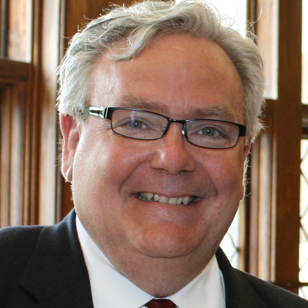
Dennis Groth
The Luddy School of Informatics, Computing, and Engineering Dean Raj Acharya, who has led the school since 2016, is transitioning to a new role with Indiana University leadership as associate vice president for research and AI innovation in the Office of the Vice President for Research.
Dennis Groth, currently IU Bloomington’s vice provost for undergraduate education, will serve as the dean of the Luddy School on an interim basis.
Acharya will develop the new Indiana AI Collaboration Center, which will facilitate collaboration between IU Bloomington, the Naval Surface Warfare Center Crane, the Indiana National Guard’s new Cyber Battalion, and the Indiana industry on the development of practical AI applications in areas that include microelectronics, cybersecurity, supply chain integrity, and fraud prevention and detection.
“During Dean Acharya’s tenure, the Luddy School settled into its fabulous new home, gained a new name, and launched a major new program. We are all grateful for Dean Acharya’s leadership at the School and look forward to his continuing contributions to the university,” said IU Bloomington Provost Lauren Robel.
Acharya oversaw the move of the Luddy School to spectacular Luddy Hall in 2018, helped establish the Department of Intelligent Systems Engineering—the first engineering program in IU’s 200-year history—and expand the Luddy School’s offering of degrees both on campus and online. His new role will see Acharya work closely with Fred Cate, IU vice president for research, Distinguished Professor, and C. Ben Dutton Professor of Law, vice provost for research Jeff Zaleski, and director of federal research relations, Laura Kolton.
“I attribute any success during my tenure as Luddy dean to the hard-working faculty, staff, students, and well-wishers,” Acharya said. “Their support helped take the School to the next level, and it is my honor to have had the opportunity to serve as dean.”
Groth will be returning to the Luddy School, where he earned his Ph.D. in computer science in 2002 and served as a professor of informatics. He also served as the associate dean for undergraduate studies for the then-School of Informatics and Computing from 2008-13, where he oversaw the school’s undergraduate and graduate career services, undergraduate curricula, undergraduate recruiting and advising, enrollment management, academic records and recording of degrees, course and classroom scheduling, scholarship review and awards, and maintained the academic standards of the degree programs.
“I’m very excited and honored to be taking on the role of interim dean for the Luddy School,” Groth said. “Our school has accomplished so much in its 20-year history, and with the construction of the state-of-the-art Luddy Center for Artificial Intelligence beginning this spring, we’re poised to continue our leadership role in technology and innovation.”
Since becoming vice provost for undergraduate education in 2014, Groth has been directly responsible for unit leadership for a broad range of institution programs and offices, including University Division and the Career Development Center, both of which advance academic advising and career coaching for over 6,000 beginning students each year; the Advance College Project, which has implemented college coursework in more than half of all Indiana high schools; the Wells Scholars Program; the Hutton Honors College; the Center for Innovative Teaching and Learning (in partnership with UITS); the Service Learning Program; and the Office of National Scholarships and Awards. Groth was also responsible for accreditation for the campus, curricular procedures and interaction with the Indiana Commission on Higher Education, and administering the campus-wide general education curriculum. He established the Center for Learning Analytics and Student Success (CLASS), which engages faculty across campus in fundamental data research on factors leading to student success in college.
“Professor Groth has shown enormous creativity and vision in the areas of student experience, curriculum development, and the use of data to improve educational outcomes,” Robel said. “I am grateful that he is willing to take on this new responsibility at this moment of great momentum for the Luddy School.”
Established in 2000, the Luddy School of Informatics, Computing, and Engineering is one of the broadest of its kind in the world. Blending the fields of computer science, informatics, intelligent systems engineering, information and library science, and data science, the Luddy School is home to more than 3,000 students from the United States and around the world. The forward-looking School’s faculty are world-renowned experts in their respective fields and lead the way in critical areas. Computer and information sciences research expenditures are ranked 12th in the country.

